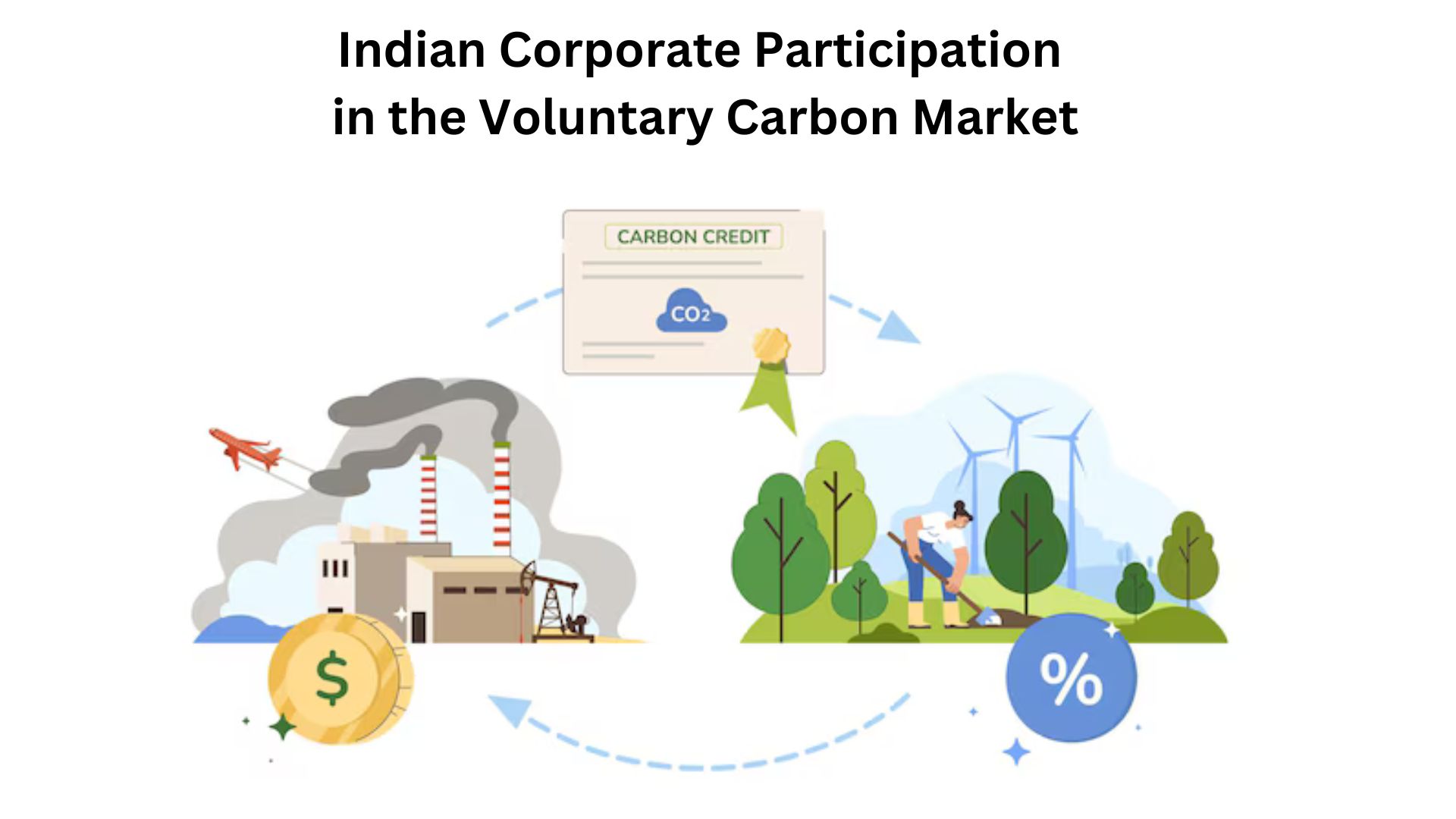Introduction
As global awareness of climate change intensifies, businesses worldwide are increasingly recognizing their role in mitigating environmental impacts. Indian corporations, in particular, have begun to take significant steps towards sustainability by engaging in the voluntary carbon market. This market allows companies to offset their greenhouse gas (GHG) emissions by purchasing carbon credits, which represent the reduction or removal of emissions elsewhere. Indian corporate participation in the voluntary carbon market reflects a growing commitment to environmental responsibility, driven by both regulatory expectations and corporate social responsibility (CSR) initiatives. This essay explores the dynamics of Indian corporate participation in the voluntary carbon market, the motivations behind it, the impact on corporate strategies, and the challenges and opportunities that lie ahead.
Understanding the Voluntary Carbon Market
The voluntary carbon market is a mechanism that allows companies, organizations, and individuals to purchase carbon credits voluntarily, as opposed to mandatory compliance with regulatory frameworks. These carbon credits are generated through projects that reduce, avoid, or sequester GHG emissions, such as reforestation, renewable energy, and energy efficiency projects. Each carbon credit typically represents one metric ton of carbon dioxide equivalent (CO2e) that has been either removed from the atmosphere or prevented from being emitted.
In India, the voluntary carbon market is gaining traction as companies seek to enhance their environmental credentials, meet sustainability targets, and contribute to global climate goals. By participating in this market, Indian corporations can offset their carbon footprints, thereby demonstrating their commitment to sustainability and climate action.
Motivations for Indian Corporate Participation
Indian corporations are motivated to participate in the voluntary carbon market for several reasons:
- Corporate Social Responsibility (CSR):
Indian companies are increasingly incorporating sustainability into their CSR strategies. The Indian Companies Act, 2013 mandates that certain large companies spend a minimum percentage of their profits on CSR activities. Many companies have chosen to invest in carbon offset projects as part of their CSR initiatives, aligning their business practices with global environmental goals and enhancing their brand reputation. - Enhancing Brand Image and Consumer Trust:
Consumers are becoming more environmentally conscious, and businesses are responding by integrating sustainability into their core values. By participating in the voluntary carbon market, Indian companies can strengthen their brand image, attract environmentally conscious customers, and differentiate themselves from competitors. - Investor Pressure and Risk Management:
Investors are increasingly factoring environmental, social, and governance (ESG) criteria into their investment decisions. Companies that actively participate in the voluntary carbon market can improve their ESG ratings, making them more attractive to investors. Additionally, reducing carbon footprints helps companies manage risks associated with climate change, such as regulatory changes, supply chain disruptions, and reputational damage. - Preemptive Compliance with Future Regulations:
While participation in the voluntary carbon market is not mandated by law, companies may see it as a way to prepare for potential future regulations. By reducing their carbon footprints now, Indian corporations can position themselves to meet stricter environmental standards that may be imposed in the coming years. - Employee Engagement and Recruitment:
Employees, particularly younger generations, are increasingly seeking employers with strong sustainability commitments. Participation in the voluntary carbon market can boost employee morale, attract top talent, and foster a sense of purpose within the organization.
Impact on Corporate Strategies
Participation in the voluntary carbon market has had a profound impact on corporate strategies in India. Several trends have emerged as companies integrate carbon offsetting into their broader business models:
- Integration of Sustainability into Core Business Practices:
Indian corporations are increasingly viewing sustainability as a core component of their business strategies, rather than a peripheral activity. This shift is evident in the integration of carbon offsetting into supply chain management, product development, and corporate governance. - Adoption of Net-Zero Targets:
Many Indian companies are setting ambitious net-zero targets, aiming to eliminate or offset all their GHG emissions. Participation in the voluntary carbon market is a key tool in achieving these targets, allowing companies to balance out their residual emissions through the purchase of carbon credits. - Investment in Carbon Offset Projects:
Some Indian corporations are not just purchasing carbon credits but also investing directly in carbon offset projects. By funding renewable energy, reforestation, or sustainable agriculture initiatives, companies can generate their own carbon credits while contributing to local community development. - Collaboration and Partnerships:
To maximize the impact of their participation in the voluntary carbon market, Indian companies are increasingly forming partnerships with NGOs, government agencies, and other businesses. These collaborations can enhance the credibility of carbon offset projects, ensure their alignment with global standards, and create shared value.
Challenges Faced by Indian Corporations
Despite the growing interest in the voluntary carbon market, Indian corporations face several challenges:
- High Costs and Market Volatility:
The cost of carbon credits can vary significantly, depending on factors such as the type of project and the standard under which the credits are certified. Market volatility can make it difficult for companies to budget for carbon offsets and plan their sustainability strategies. - Limited Awareness and Expertise:
While larger corporations may have the resources to navigate the voluntary carbon market, smaller companies often lack the expertise and awareness needed to participate effectively. This can limit their ability to engage in carbon offsetting and benefit from its associated advantages. - Credibility and Greenwashing Concerns:
The credibility of carbon offset projects is crucial for their success. However, concerns about greenwashing—where companies exaggerate or falsely claim environmental benefits—can undermine the trust in the voluntary carbon market. Ensuring transparency, rigorous verification, and adherence to global standards is essential to maintaining market integrity. - Regulatory Uncertainty:
The regulatory environment for carbon markets in India is still evolving, with occasional ambiguities in policies related to carbon credits and offset projects. This uncertainty can deter investment and participation in the voluntary carbon market.
Opportunities and Future Prospects
Despite these challenges, the future of Indian corporate participation in the voluntary carbon market is bright, with several opportunities on the horizon:
- Growth of Domestic Carbon Standards:
The development of robust domestic carbon standards in India could enhance the credibility and attractiveness of carbon credits generated within the country. These standards would provide clear guidelines for project developers and ensure that carbon offsets meet international benchmarks. - Expansion of Renewable Energy and Nature-Based Solutions:
As India continues to expand its renewable energy capacity and invest in nature-based solutions like reforestation and sustainable agriculture, the potential for generating high-quality carbon credits will increase. Corporations can capitalize on these opportunities to meet their sustainability goals. - Technological Advancements:
Innovations in technology, such as blockchain, artificial intelligence, and remote sensing, can enhance the transparency, efficiency, and scalability of the voluntary carbon market. Indian companies that leverage these technologies will be better positioned to participate in the market and generate value from carbon offsets. - Increased Global Demand for Carbon Credits:
As more countries and corporations commit to net-zero targets, the demand for carbon credits is expected to rise. Indian companies can benefit from this growing demand by participating in the voluntary carbon market and potentially generating revenue from the sale of surplus credits.
Conclusion
Indian corporate participation in the voluntary carbon market is a testament to the growing recognition of the private sector’s role in combating climate change. By engaging in this market, Indian companies are not only offsetting their carbon footprints but also demonstrating leadership in sustainability, enhancing their brand reputation, and preparing for future regulatory challenges. While there are obstacles to overcome, the opportunities for growth and innovation in this space are vast. As India continues to develop its carbon market infrastructure and expand its sustainability initiatives, corporate participation in the voluntary carbon market is likely to play an increasingly important role in shaping the country’s transition to a low-carbon economy.




Leave a Reply